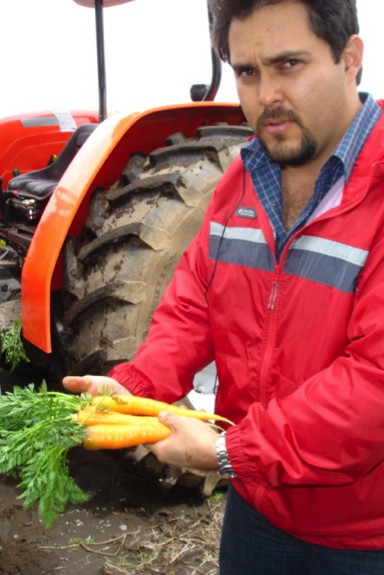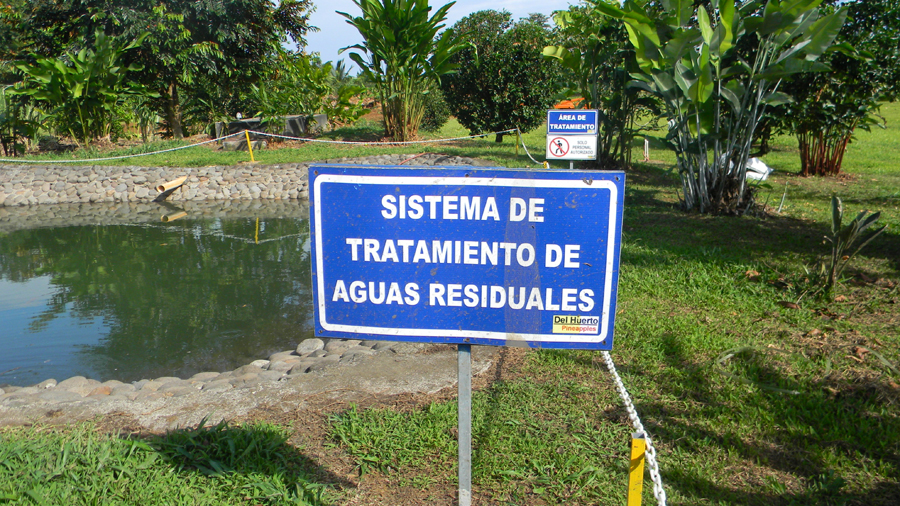Herrera brothers show commitment to sustainable entrepreneurship
When brothers Fabrizio (’95) and Christian Herrera (‘96) from Costa Rica began their studies at EARTH, they never imagined that 19 years later they would own a company that exports fruits and vegetables. Today, their company, Del Huerto, S.A., exports 450,000 pineapples per week along with other products such as beets, cabbage, sweet potatoes plantains, melon and watermelon, to England, Puerto Rico, Italy, the United States, Russia and other destinations.
 During their first three years at EARTH, each brother ran a business as part of the Jorge Manuel Dengo O. Entrepreneurial Projects Program. Through the program, all students at EARTH establish and operate a company during their first three years of study. Companies are formed among classmates from different countries, and groups must prepare a business plan and defend its social, economic and environmental viability. Approved projects receive a $3,000 loan from the University to produce and market their product. In their third year, the students close the company and analyze its profitability and effectiveness. Fabrizio operated a beef cattle project in a semi-stabled system, while Christian and four classmates started a pineapple production and packing company called “Cinco Locos” (“Five Crazy Guys,” in English).
During their first three years at EARTH, each brother ran a business as part of the Jorge Manuel Dengo O. Entrepreneurial Projects Program. Through the program, all students at EARTH establish and operate a company during their first three years of study. Companies are formed among classmates from different countries, and groups must prepare a business plan and defend its social, economic and environmental viability. Approved projects receive a $3,000 loan from the University to produce and market their product. In their third year, the students close the company and analyze its profitability and effectiveness. Fabrizio operated a beef cattle project in a semi-stabled system, while Christian and four classmates started a pineapple production and packing company called “Cinco Locos” (“Five Crazy Guys,” in English).
The fact that the brothers have become business owners, along with 23 percent of EARTH alumni, shows that the program is shaping leaders with an entrepreneurial mentality.
Giving students money to run their own enterprises was a bold idea at the time the Entrepreneurial Projects Program was created in 1990 and was only possible thanks to a donation from the W.K. Kellogg Foundation. EARTH president, José Zaglul admits they never imagined that the projects would have had such good results.
“At the very beginning we thought the fund would last only some years and that we would have to find other financial support for this,” explains President Zaglul.
That never happened. As loans are paid back with interest, and two thirds of the net profit from each project is divided among the students, while one third is returned to the fund, the fund has sustained itself. And since approximately 80 percent of the projects make a profit or break even, the fund’s value has actually increased over time.
“I remember when we used to go to the field every Wednesday to work on the pineapples. We were the farm laborers, the accountants, the marketers, and business managers,” said Christian.
More than a decade after their entrepreneurial projects were positively evaluated, Fabrizio and Christian co-own Del Huerto. Eighty-five percent of its exports are pineapples, which the company sources from 130 small farmers in San Carlos and the Caribbean region of Costa Rica.
Del Huerto works primarily with small and family-owned businesses. For the company, the ideal grower can sustainably maintain a small pineapple plantation in his or her backyard. “We want to help the local economy, that’s why we work with local and small farmers and try to hire independent dispatchers,” remarks Christian.
There’s no doubt that the Entrepreneurial Projects Program has had important impact on the Herrera brothers’ commitment to socially and environmentally responsible business. Del Huerto and its growers donate the value of one box of pineapple for every truck received in the plant, with the proceeds going to a fund to develop different projects in the community. Currently, the fund supports 40 projects including providing economic help for an elderly home, buying equipment to prevent attacks from African bees (a common invasive species in the area), maintenance of community green spaces and a new roof for an elementary school.
The company has also taken impressive steps toward greater environmental responsibility. For example, its packing plant has an innovative water treatment system, in which tilapia fish serve as bio-measurement to ensure the water has enough oxygen and the levels of organic contamination are low. In addition, Del Huerto encourages the growers to establish environmental protection areas particularly around waterways.
Fabrizio and Christian have proven that businesses can succeed economically, while contributing to the social and environmental well-being of their communities.




